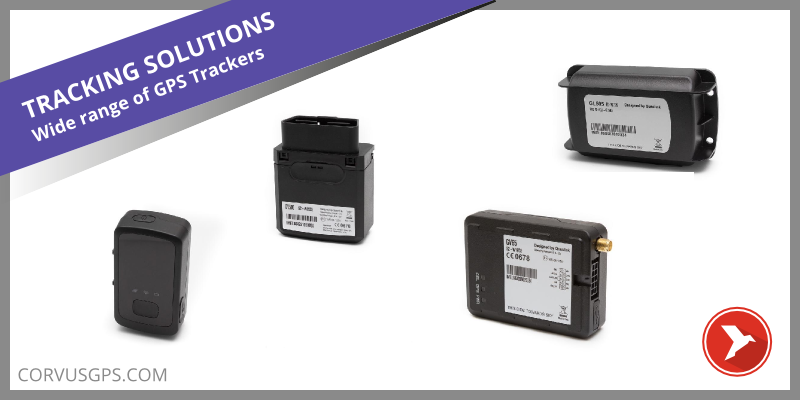GPS Tracking Solutions – The GPS Trackers
History of GPS tracking solutions
The GPS (Global Positioning System) is a network of satellites orbiting around Earth transmitting signals receivable with GPS receiver units. The system was originally designed for military purposes by the United States (NAVSTAR GPS) and the Soviet Union (GLONASS), but since 1978 the usage of these systems was made available to the general public. The GPS receivers on earth with the help of the signals transmitted by the GPS satellites are able to determine their current position, altitude and velocity. Read further about the history of the GPS and GLONASS systems in our article…
Passive and Real-Time GPS Tracking Solutions
When talking about GPS tracking solutions we differentiate between passive tracking solutions and real-time tracking solutions. Passive GPS tracker devices (or GPS loggers) store GPS location, velocity and direction data. After the vehicle returns to a predetermined location the device is removed and the data it contains gets transferred to a computer for further evaluation. Real-time GPS tracker devices collect the same kind of information, but unlike passive trackers, they immediately transmit their data usually over mobile internet or a satellite connection, so the data appears in real time on the other end.
Wide range of GPS trackers
GPS trackers are used in a wide variety of fields, typically the manufacturers design special devices for every area of use, further optimizing their functionality. Let’s see the most common fields of use…
Vehicle Tracking
The most common way of using GPS tracking solutions is vehicle tracking. Vehicle tracking can be of business or personal use. In case of personal tracking the main goal is usually protecting against theft, for business use the focus is usually on the fleet management aspect. Read further about fleet management solutions here…
Asset Tracking
The position of assets, like the location of their vehicles can be important for any business, but this kind of usage requires a special GPS tracking solution, since in case of some devices power can not be supplied on location. People often use hibernating asset GPS trackers, which operate on batteries and only send a couple of reports about their location every day. For the rest of the time they hibernate, waiting for the time of the next report. The operational time of these asset trackers can reach up to 1000 days without the need for a high capacity power source. Read more on asset GPS trackers and related GPS tracking solutions here…
Ship tracking
Trackers are used for following the positions of ships, but in case of cruise ships and sea liners the common GPS tracking solutions using mobile networks can not transmit their data to the data centers since there is no reception at sea. For ship tracking we use devices that operate with satellite connections, so they can transmit data from anywhere around the world. The operational cost of such devices is much higher than of those operating on mobile networks.
Personal Location Tracking
The reduction in size and consumption, GPS trackers developed for global positioning open up new possibilities, like personal tracking. These days, a good quality GPS tracker that fits in our pocket can operate effectively for 10-15 hours, making it easy to track our children, employees or we can even use these devices for workforce management or vehicle tracking in case when a permanently installed GPS tracker is not sufficient to fulfill our expectations.
Cell Phone Location Tracking
The popularity of smartphones has revolutionized the world of GPS tracking as well, thanks to the fact that these days every smartphone contains a built-in GPS receiver and a mobile data connection. These devices — with the help of an application — can be transformed into full-fledged trackers, furthermore sometimes their powers exceed the ones of regular GPS trackers. You can read more on the pros and cons of GPS phone tracker applications in my new article soon…
Wide range of GPS tracking Solutions
Of course there are numerous GPS trackers out there, and these can be used in a wide variety of fields. Let’s see what are the most common GPS tracking solutions.
Logistics
On logistical fields we happily use GPS asset trackers because with the help of such devices the location of any one unit can be easily determined, without the need for constant administration: the asset GPS tracker transmits its position regularly, which can be easily displayed on a map in real time, or by searching for an earlier time we can see the past locations, from these pieces of information we can determine when, where and for how long did the tracked asset stay there.
Fleet management and Telematics
For fleet management and telematics purposes we typically use vehicle GPS trackers, which can be regular devices or devices that connect to the diagnostic port (OBD) of the vehicle. Traditional trackers are fairly common, with the help of these we can easily generate reports, traveling warrants, optimize our routes and save fuel. Even though many expansions can be purchased for regular trackers (e.g. fuel sensors), thanks to their easy installation processes, GPS trackers that connect to the diagnostic port of the vehicle gain more and more popularity. In spite of their simplicity, these devices can tell us even more information on the vehicle, than standard GPS tracking solutions.
Workforce management
For workforce management and organizing work we either use trackers installed inside the vehicles or personal GPS trackers, which in turn can be either a device specifically designed for this purpose or a phone GPS tracker app.
You can find out more about GPS tracking solutions offered by CorvusGPS here…
Try our mobile tracking apps for Android and iOS now!
You don’t have an account yet?
Visit CorvusGPS.com and start your free trial.
- Get Started! – A Tutorial for Fleet Managers - January 17, 2021
- Get Started! – A Tutorial for Invited Users - January 17, 2021
- Unveiling the secret – Coloured pushpins - January 21, 2020






Jewel Ahmed
How to work GPS device????